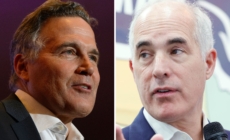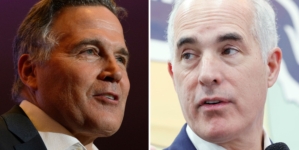-
Chuck Scarborough to Step Down as WNBC News Anchor After 50-Year Career - 9 mins ago
-
‘Wordle’ Today #1,252 Answer, Hints and Clues for Friday, November 22 - 26 mins ago
-
The UK Faces a Dilemma: Cozy Up to Trump or Reconnect With Europe? - 53 mins ago
-
NYT ‘Connections’ November 22: Clues and Answers for Game #530 - about 1 hour ago
-
Bob Casey Concedes to David McCormick in Pennsylvania Senate Race - 2 hours ago
-
Police in New Jersey’s Capital Violate Residents’ Rights, U.S. Finds - 2 hours ago
-
Steelers WR Van Jefferson Questionable to Return With Significant Leg Injury - 2 hours ago
-
Pam Bondi Is Trump’s New Choice as Attorney General. Here’s What to Know About Her. - 2 hours ago
-
Newsom touts his economic plans in California’s conservative regions - 2 hours ago
-
Trump Won’t Care that RFK Jr. Compared Him to Hitler, Ex-Aide Says - 3 hours ago
OpenAI Workers Turn on Sam Altman Over Major New Bill
Thirty-eight current and former OpenAI employees have publicly contradicted CEO Sam Altman’s stance on California’s new AI regulation bill, leaving them at odds with the creator of ChatGPT on how to ensure the safe development of artificial intelligence.
Along with current and former employees from Meta, Google DeepMind, Anthropic and xAI, they signed an open letter supporting California Senate Bill 1047 (SB 1047), directly opposing OpenAI’s official position. The bill, which has passed both houses of the state Legislature, would hold AI developers liable for catastrophic harm caused by their models if appropriate safety measures weren’t taken.
The employee letter warns that “the most powerful AI models may soon pose severe risks, such as expanded access to biological weapons and cyberattacks on critical infrastructure.” It argues that implementing reasonable safeguards against these harms is “feasible and appropriate” for leading AI companies.

ANDREW CABALLERO-REYNOLDS/AFP/Getty Images
The public break from company leadership is notable given OpenAI’s past attempts to silence employees speaking publicly. Earlier this year, it was reported that the company had tried to make departing employees sign lifetime non-disparagement agreements in exchange for vested equity, a practice Altman later apologized for and rescinded after backlash.
The support for SB 1047 within OpenAI’s ranks comes amid some high-profile departures from the company. Futurism recently reported that several top executives have left OpenAI, including co-founder John Schulman, President Greg Brockman and VP of Consumer Product Peter Deng.
The bill, introduced by California state Senator Scott Wiener as the “Safe and Secure Innovation for Frontier Artificial Intelligence Models,” was met with a letter of opposition by OpenAI on August 21.
In the letter, OpenAI’s chief strategy officer, Jason Kwon, stated that the company believes AI regulation, especially concerning national security and U.S. competitiveness, should be handled at the federal level rather than through state laws. While opposing state-level regulation of AI models, OpenAI acknowledged that states can play a role in developing targeted AI policies for specific issues like hiring bias and deepfakes.
Kwon argued that the White House Office of Science and Technology Policy, the National Institute of Standards and Technology, the U.S. AI Safety Institute and the National Security Council, among other defense and intelligence agencies, already have the resources and knowledge to deal with crises or potential international implications related to AI risk.
“If states attempt to compete with the federal government for scarce talent and resources, it will dilute the already limited expertise across agencies, leading to a less effective and more fragmented policy for guarding against national security risks and critical harms,” Kwon added.
In response, Weiner’s office issued a statement tackling several elements of OpenAI’s claims that the bill was detrimental to the California tech industry.
“As I’ve stated repeatedly, I agree that ideally Congress would handle this. However, Congress has not done so, and we are skeptical Congress will do so,” the statement said.
Regarding OpenAI’s claim that companies will leave California if the bill passes, Weiner went on to say: “This tired argument – which the tech industry also made when California passed its data privacy law, with that fear never materializing – makes no sense given that SB 1047 is not limited to companies headquartered in California. Rather, the bill applies to companies doing business in California. As a result, locating outside of California does not avoid compliance with the bill.”
Governor Gavin Newsom has until September 30 to sign or veto SB 1047, which has been divisive in the tech world, with CEOs including Elon Musk backing it. While some see the bill as a necessary step to ensure responsible AI development, others, including Representative Nancy Pelosi and San Francisco Mayor London Breed, have joined OpenAI in opposing it.
Newsweek reached out to OpenAI via email for comment.
Source link




















